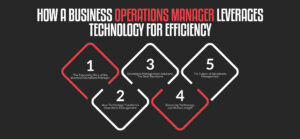
How a Business Operations Manager Leverages Technology for Efficiency
Did you know that 82% of companies that invest in digital operations tools report faster decision-making and higher efficiency? This is not just a trend; it indicates that technology is now at the core of contemporary business.
The business operations manager is at the focal point of the transformation; the professional who faces the challenge of aligning people, processes, and performance. What was once regarded as personnel who dealt with task scheduling, activities managers have today become strategic professionals who use technology to lean operations, reduce expenses, and facilitate long-term expansion.
They regulate processes and reshape efficiency by implementing innovative operations management practices like automation, cloud platforms, and data-driven analytics.
Managers used to make intuitive decisions or use ancient reports previously. In this day and age, they can monitor KPIs, identify areas of inefficiency, and make precise forecasts through real-time data analytics platforms. The business operations manager can do the following now:
It is one of the metamorphic things in contemporary business because of automation. Automation solutions can save several hours of inefficient work due to invoice processing and workflow planning. Not only does this liberate employees to carry out strategic work, but it also minimizes the chances of human error.
A business operations manager, for example, is able to put in place automated reporting systems that pull data together across the departments so the resulting performance review comes faster and with accuracy. Automation incorporated into operations management solutions saves managers time, facilitates frictionless productivity, and improves productivity.
Working at a distance and using hybrid teams is the new normal. Collaboration is one way to decelerate efficiency without the appropriate technology. Thus, cloud platforms such as Microsoft Teams, Slack, and Google Workspace are crucial.
These tools simplify communication, file sharing, and up-to-date project reports, regardless of the employee’s site. A business operations manager’s ability to integrate such tools provides teams with a coherent way of action, meeting deadlines, and smooth working processes.
With operations becoming digitized, cybersecurity has become one of every business operations manager’s core concerns. Security tools, like multi-factor authentication, endpoint monitoring, and encrypted communications, take security a step further and protect sensitive information.
In addition to asset protection, adequate cybersecurity guarantees industry regulations adherence, a vital aspect of any business dealing with customer data. With secure operations management solutions, managers can be trusted and ensure long-term business continuity.
Efficiency applies to internal processes and bridges the customer journey. Businesses that use CRM (Customer Relationship Management) platforms can streamline communication, personalize their offerings, and reduce response time.
A business operations manager can leverage technology to:

The Expanding Role of the Business Operations Manager
A Business operations manager is no longer in charge of routine activities. Now are technology-led strategizers who:- Optimize workflows and monitor them.
- Cut costs. Exercise cost-cutting measures.
- Blaze digital transformations
- Conduct interdepartmental teamwork
- Implement the Operations Management Solutions that enhance efficiency.
- By embracing technology at all levels of operations, managers will be in a better position to realize and fulfill short-term efficiency and long-term growth.
How Technology Transforms Operations Management
The movement to digital tools has given a new meaning to operations management solutions since leaders are charged with making more intelligent decisions while limiting manual work as much as possible. The following are some of the most essential methods that a business operations manager employs to be tech-efficient: Data-Driven Decision Making
Data-Driven Decision Making
Managers used to make intuitive decisions or use ancient reports previously. In this day and age, they can monitor KPIs, identify areas of inefficiency, and make precise forecasts through real-time data analytics platforms. The business operations manager can do the following now:
- Track the real-time employee performance
- Analyse financial data to minimise overheads
- Make use of predictive analytics as a tool for customer demand forecasting
 Automation of Repetitive Tasks
Automation of Repetitive Tasks
It is one of the metamorphic things in contemporary business because of automation. Automation solutions can save several hours of inefficient work due to invoice processing and workflow planning. Not only does this liberate employees to carry out strategic work, but it also minimizes the chances of human error.
A business operations manager, for example, is able to put in place automated reporting systems that pull data together across the departments so the resulting performance review comes faster and with accuracy. Automation incorporated into operations management solutions saves managers time, facilitates frictionless productivity, and improves productivity.
 Cloud-Based Collaboration Tools
Cloud-Based Collaboration Tools
Working at a distance and using hybrid teams is the new normal. Collaboration is one way to decelerate efficiency without the appropriate technology. Thus, cloud platforms such as Microsoft Teams, Slack, and Google Workspace are crucial.
These tools simplify communication, file sharing, and up-to-date project reports, regardless of the employee’s site. A business operations manager’s ability to integrate such tools provides teams with a coherent way of action, meeting deadlines, and smooth working processes.
 Strengthening Cybersecurity
Strengthening Cybersecurity
With operations becoming digitized, cybersecurity has become one of every business operations manager’s core concerns. Security tools, like multi-factor authentication, endpoint monitoring, and encrypted communications, take security a step further and protect sensitive information.
In addition to asset protection, adequate cybersecurity guarantees industry regulations adherence, a vital aspect of any business dealing with customer data. With secure operations management solutions, managers can be trusted and ensure long-term business continuity.
 Enhancing Customer Experience
Enhancing Customer Experience
Efficiency applies to internal processes and bridges the customer journey. Businesses that use CRM (Customer Relationship Management) platforms can streamline communication, personalize their offerings, and reduce response time.
A business operations manager can leverage technology to:
- Automate follow-ups with customers
- Evaluate customer trends in behavior.
- Massively connect sales platforms with service platforms to enable fluid experiences.
- When operations focus on the customer, efficiency is converted to increased customer satisfaction and loyalty.

Operations Management Solutions: The Tech Backbone
Strategy and execution are brought together by adopting the right operations management solutions. These solutions are likely to involve:- Enterprise Resource Planning (ERP): Integrated finance, HR, supply chain, and operations.
- Project Management Software: Such programs as Asana or Trello make the work of a team more productive.
- Business Intelligence (BI) Tools: tools such as Power BI that transform raw data into practical knowledge.
- Workflow Automation: (Zapier or UiPath) to automate repetitive tasks.
Balancing Technology and Human Insight
Technology is vital but not a substitute for human intelligence. The business operations managers can deploy highly advanced business tools with organizational skills, strategic focus, and emotional intelligence. To illustrate, automation might run procedures, but managers are required to interpret data and make it relevant to the company’s objectives. On the same note, team members can be linked using collaboration platforms, but managers must foster a culture that embraces trust and accountability. Technology improves efficiency, and the leadership of a skilled business operations manager drives those efficiencies to translate business growth through subsequent efficiencies.The Future of Operations Management
With a growing number of businesses adopting digital transformation, the work of the business operations manager will soon broaden even more. Emerging technologies such as artificial intelligence, machine learning, and IoT (Internet of Things) are expected to embrace the next wave in operations management solutions. Managers will no longer just interpret data; they will additionally use AI-generated insights to automate the decision-making process, minimize risk, and achieve business model innovation. Individuals who embrace such innovations will make their organisations efficient and successful in the long run.Conclusion
In an era where efficiency directly impacts competitiveness, the business operations manager has become vital to organizational success. By leveraging technology, whether through automation, cloud tools, data analytics, or advanced operations management solutions, they can streamline workflows, cut costs, and enhance customer experiences. The businesses that thrive will be the ones that view technology not as a cost, but as an investment in sustainable growth. With the right mix of tools and strategic leadership, operations managers are redefining efficiency for the digital-first world.Related Blogs
 Cybersecurity on a Budget: Strategies for an Economic Downturn - When budgets tighten, cybercriminals don’t slow down; they get smarter. Economic recessions provide the ideal storm for businesses: limited resources, heightened pressure, and more attacks on organizations that skimp on security. This is why it is even more important to consider investing in managed cybersecurity services when the budget is limited, not less. During unstable […]
Cybersecurity on a Budget: Strategies for an Economic Downturn - When budgets tighten, cybercriminals don’t slow down; they get smarter. Economic recessions provide the ideal storm for businesses: limited resources, heightened pressure, and more attacks on organizations that skimp on security. This is why it is even more important to consider investing in managed cybersecurity services when the budget is limited, not less. During unstable […] Why Proactive Cybersecurity Management Beats Post-Attack Recovery Every Time - Imagine waking up to headlines about your company’s data being leaked. The systems are down, clients are panicking, and recovery teams are scrambling. Hours feel like days, and every moment costs more than the last. This isn’t a distant nightmare anymore. It’s a daily reality for businesses that choose to react instead of prevent. In […]
Why Proactive Cybersecurity Management Beats Post-Attack Recovery Every Time - Imagine waking up to headlines about your company’s data being leaked. The systems are down, clients are panicking, and recovery teams are scrambling. Hours feel like days, and every moment costs more than the last. This isn’t a distant nightmare anymore. It’s a daily reality for businesses that choose to react instead of prevent. In […] Why Managed Cybersecurity Services Are No Longer Optional - Every 39 seconds, a cyberattack occurs somewhere in the world. In fact, global cybercrime damages are projected to reach $10.5 trillion annually by 2025 (Cybersecurity Ventures). This rising menace is no longer a remote possibility to businesses of all sizes: it is a day-to-day reality. The increased remote working, cloud usage, and digital-first approaches have […]
Why Managed Cybersecurity Services Are No Longer Optional - Every 39 seconds, a cyberattack occurs somewhere in the world. In fact, global cybercrime damages are projected to reach $10.5 trillion annually by 2025 (Cybersecurity Ventures). This rising menace is no longer a remote possibility to businesses of all sizes: it is a day-to-day reality. The increased remote working, cloud usage, and digital-first approaches have […]
Schedule a Consultation
Contact McLane Intelligent Solutions and Experience Texas IT Services Without The Geek Speak
